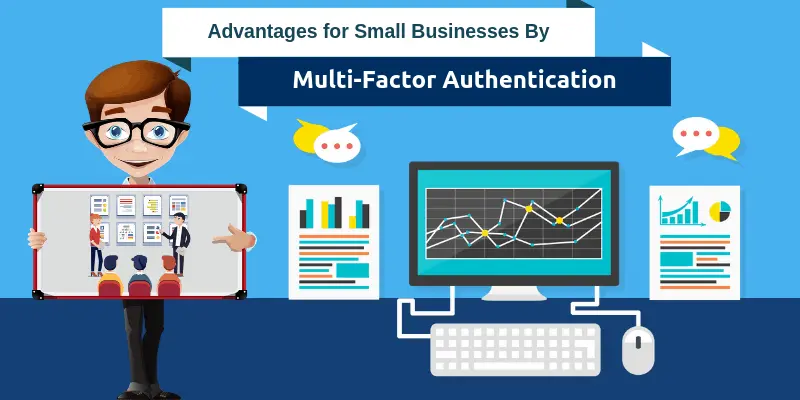
Multi-Factor Authentication: Advantages For Small Businesses
Data theft in the digital environment is becoming increasingly common. The cost of losses caused by hackers is breaking new records with every new data breach. Although passwords have undergone a change since the beginning of the internet, so has the power of the hackers.
Password protection today can simply be called the stone-age for the digital business environment. While its existence cannot be ignored, relying solely on passwords for data protection is definitely not enough. Security is a wide term and limiting it with passwords is not what a smart entrepreneur should do.
Cybersecurity analysts strongly recommend moving ahead of passwords i.e. to add more layers of security. Although earlier the bigger firms considered MFA a hassle, with time they have understood that multi-factor authentication can be useful as well as simple.
Why are passwords not enough?
Securing the company’s accounts only with passwords makes it highly vulnerable to hackers and data thieves. The reason is simple: the password is not strong enough.
A strong password must be hard to crack. It must contain a variety of characters such as alphabets both capital as well as small, numbers, signs and symbols. Such a password is stronger than one that consists of one kind of element.
But the problem with a strong password is that:
1. Employees may find it difficult to remember
2. They may want to use the same password on multiple accounts
3. They may prefer simpler passwords for ease of authentication
Passwords miss out on the one basic key to data security i.e. identity. Any individual who gets hold of the password, irrespective of his identity, can readily break into the system and sensitive information can be stolen. That is when small and medium-sized businesses need multi-factor authentication.
What is meant by Multi-Factor Authentication?
Multi-Factor Authentication is a system of adding advanced authentication factors to identify the users, hence warding off the weakness of using ‘passwords only’. The aim is to inculcate multiple layers of security to keep hackers far away from sensitive data. Research suggests that firms who only relied on passwords for cybersecurity were under a higher risk of getting their data hacked.
A significant benefit that makes multi-factor authentication stand out is that it is more flexible compared to two-factor authentication. The user can simply customize the security depending upon his needs, the sensitivity of the data and the level of security he wishes to add.
Multi-Factor Authentication consists of the following elements:
a) A strong password that the user can remember i.e. something you know
b) A mobile device that can be used to send codes or OTPs (One Time Password) i.e. something you own
c) A personal identity such as fingerprint, optical print, etc i.e. something else
Each of these elements helps to compensate for the weaknesses of the previous one, thus ensuring tighter security.
Benefits of Multi-Factor Authentication
There are certain solid reasons that make Multi-Factor Authentication the need of the hour. Some of them are as discussed below:
A) Setting Another Level of Security Standards
We can take up two situations to understand the importance of MFA in a better way. First, if a hacker manages to break the password and the user has no additional level of authentication installed. In this case, the hacker may immediately get his hands on the critical information and cause a loss to the company.
Second, with MFA, hacking the password is just one step. There may be 2 or more levels of authentication that the computer will need to identify if it is the actual user. Although no level of security is perfect, the chances of the hacker giving up are higher in this case.
B) Multi-Factor Authentication is Easy and Affordable
Most small businesses refrain from Multi-Factor Authentication because they assume it requires a lot of resources, funds, and knowledge. This is so not the case. MFA can be applied by anyone without any specific requirements. With a mobile device, biometric prints and a few applications available online for free a small business can add multi-level authentication to their data.
C) Strong passwords are strongly encouraged
As already discussed, passwords are the weakest links when it comes to data security. With MFA, the users tend to get more sincere towards data protection. They slowly get into the habit of using strong and unique passwords on every platform. With a strong password, to begin with, the hackers tend to lose the inspiration of hacking into the data that has Multi-Factor Authentication.
D) It Is Now A Compulsion In Certain Areas
Governments in several states have now mandated Multi-Factor Authentication. Services providers that deal with their client’s personal information such as Health Insurance companies. Financial Services etc need to ensure Multi-Factor Authentication for their client’s data.
A Final Word
With small businesses slowly moving to the cloud, the need for Multi-Factor Authentication is also gaining importance for them. Every data is important data. No matter what the information may be, hackers must not be given the leverage to access it. Thus, it is high time for small businesses to take MFA sincerely.






